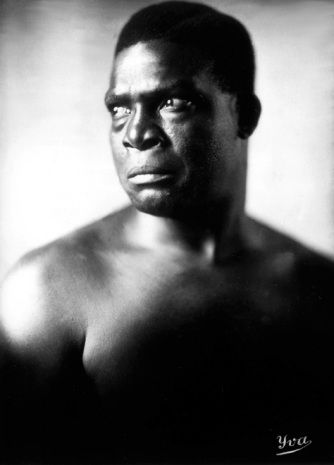
Louis Brody captivated audiences during the early twentieth century as an actor, musician, and wrestler. Born as M’bebe Mpessa in the German colony of Cameroon in 1892, Brody quickly learned how to speak German and later moved to Germany in the years prior to World War I. He later went on to appear in over thirty films and became the highest-paid black actor within the German filmmaking industry. His roles often included various types of Africans or “jungle primitives” with stereotypical character traits. Photos of Brody during his periods as a musician and wrestler also exuded the energy of exoticism and racism seen in his film career. He couldn’t simply be an actor, musician, or wrester; he had to be a black actor, musician, and wrestler. Brody’s acting career would face significant obstacles with the subsequent rise of Hitler and the Nazi regime.
Brody’s continued involvement in the African Relief Organization makes his survival of the Nazi era even more astonishing. He had co-founded the organization in 1918 to speak out against the racial discrimination of Africans. In addition, Brody would later join the “German Section of the League for Defense of the Negro Race” as he became more outspoken in his fight for racial equality. Brody also worked to protest the propaganda unleashed against French colonial soldiers stationed in the Rhineland after World War I. In order to support himself financially, Brody took part in several German propaganda films throughout the war period portraying various “African Chiefs” in films such as Carl Peters and Germanin, and lesser roles such as servants, porters, and sailors in other films. Brody even received French citizenship when his rights were stripped via the 1935 Reich Citizenship Law to maintain his safety. After the war had concluded, Louis Brody’s career slowed until his death in 1952 at the age of 59. His life of advocacy for Afro-Germans and fame in cinema paved the way for other black people to gather acclaim within German culture.
– Madelyn Bourgoine (University of Missouri)